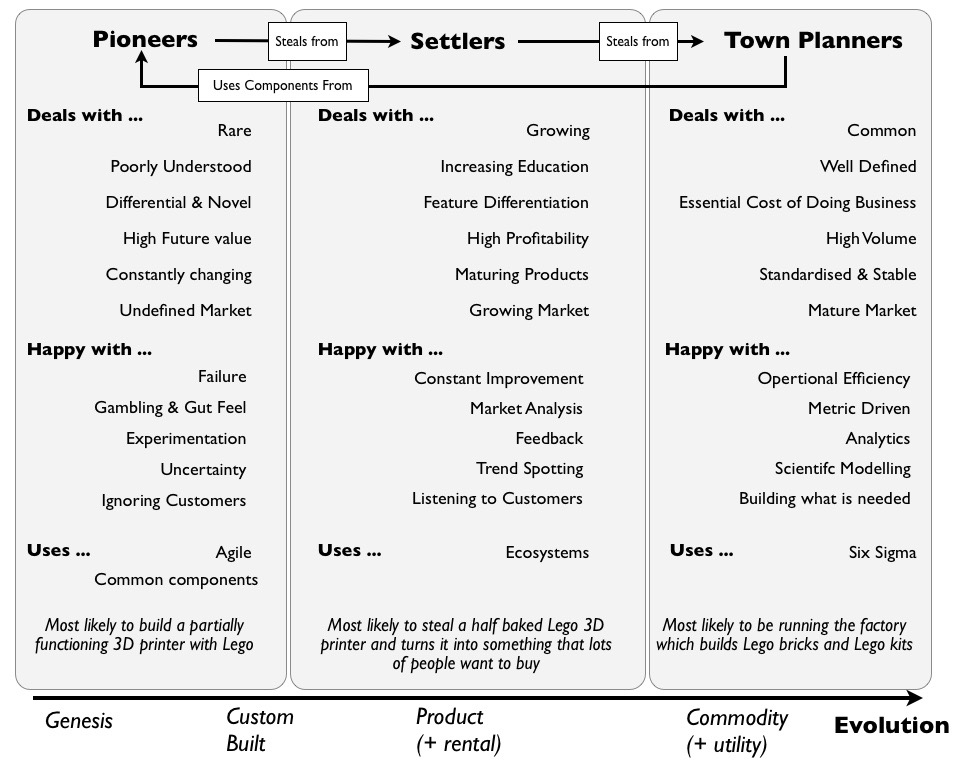Pioneers, settlers, and town planners
blog.gardeviance.org/2012/06/pioneers-s..., by Simon Wardley, March 15, 2015The concept of Pioneers, Settlers, and Town Planners is something that I share with many people in thinking about their organizations. I find it a really useful way to think about the role of people within an organization, and what a person is best suited for. I am a Pioneer-to-Settler kind of guy.
I learned it from Simon Wardley in his article On Pioneers, Settlers, Town Planners and Theft., and have been sharing it ever since.
The newest article by Wardley on this is from 2012, with all the mapping and diagrams laid out Pioneers, Settlers, and Town Planners.
Simon has written about the concept much earlier than the linked 2015 post (circa 2005 - 2006), including this article where he sources it back to Robert X. Cringely’s book, where it is called Commandos, Infantry, and Police.
Jeff Atwood1wrote about that phrase and sourcing way back in 2004:
As I was driving home, I found myself thinking about a favorite section of the book Accidental Empires, by longtime computer journalist Robert X. Cringely. Originally published in 1993, it’s getting a little long in the tooth, but it still contains a lot of great insights about the personalities that drove innovation in silicon valley – from a guy who personally knew many of the players.
I> In the chapter “On The Beach”, Cringely talks about the three distinct groups of people that define the lifetime of a company: Commandos, Infantry, and Police
#todo Look
Definitions
 The original article talks about "theft" and the hand off between different groups / archetypes / stages of a product and organization.
The original article talks about "theft" and the hand off between different groups / archetypes / stages of a product and organization.
Pioneers
Pioneers are brilliant people. They are able to explore never before discovered concepts, the uncharted land. They show you wonder but they fail a lot. Half the time the thing doesn't work properly. You wouldn't trust what they build. They create 'crazy' ideas. Their type of innovation is what we call core research. They make future success possible. Most of the time we look at them and go "what?", "I don't understand?" and "is that magic?". In the past, we often burnt them at the stake. They built the first ever electric source (the Parthian Battery, 400AD) and the first ever digital computer (Z3, 1943).
Settlers
Settlers are brilliant people. They can turn the half baked thing into something useful for a larger audience. They build trust. They build understanding. They learn and refine the concept. They make the possible future actually happen. They turn the prototype into a product, make it manufacturable, listen to customers and turn it profitable. Their innovation is what we tend to think of as applied research and differentiation. They built the first ever computer products (e.g. IBM 650 and onwards), the first generators (Hippolyte Pixii, Siemens Generators).
Town Planners
Town Planners are brilliant people. They are able to take something and industrialise it taking advantage of economies of scale. They build the platforms of the future and this requires immense skill. You trust what they build. They find ways to make things faster, better, smaller, more efficient, more economic and good enough. They build the services that pioneers build upon. Their type of innovation is industrial research. They take something that exists and turn it into a commodity or a utility (e.g. with Electricity, then Edison, Tesla and Westinghouse). They are the industrial giants we depend upon.
Via Wardleypedia, sourced from Wardley's The only structure you'll ever need … until the next one.
-
His blog / handle is Coding Horror, and he's the founder of Stack Overflow and Discourse ↩